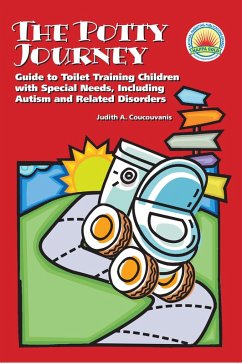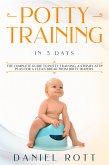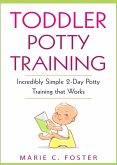Using traditional toilet training books and methods are not always helpful because the autism population does not think the same way a neurotypical child does. The child with autism may not care about pleasing parents or receiving verbal praise. Because there may be significant developmental delays, the toileting process may not be started until after the age of four. Using a diaper to eliminate has been the routine for several years and this can be hard to change. Children's books to introducing toilet training may not be appropriate because the child is too big for a potty chair or using the potty chair then transitioning to the toilet becomes yet another change and obstacle in this process.
All of these concerns may feel insurmountable and overwhelming when making the decision to begin toilet training. Judith Coucouvanis has come to the rescue with her new book The Potty Journey: Guide to Toilet Training Children with Special Needs, Including Autism and Related Disorders that empowers parents and professionals with practical information to make this journey a success. She uses the concept of a journey/trip and all the things one would need to do to make the trip a successful one. It is these planning tips and manageable steps that make toileting "do-able".
One of the biggest quandaries parents face is not knowing when to start toileting. Judy outlines considerations when to begin toileting in the second chapter. She discusses mental age which is not the same as chronological age, the ability to remain dry for 1 - 2 hours at a time, and being over the age of four when bodily functions are more mature. It is also important that you as the parent are emotionally ready for this commitment which takes several weeks, and that there are no additional life stressors such as a move, divorce, job change, or major illness.
One key to successful toileting is using a team approach. Everyone who spends time with that child should be involved in the toileting process. Children with autism don't generalize from one situation to the next so for success to occur there has to be a consistent toileting routine and approach throughout the child's day which may unfold in several places.
The author introduces the Daily Progress Record (DPR) in chapter 3 which is the foundation of the toileting process. She teaches how to practice toileting, use rewards, and supports the child's learning with visual examples. She dedicates two chapters to troubleshooting problems. The book is peppered with thoughts from parents and professionals who have gone through this journey. Their comments offer positive support and encouragement. The final chapter is dedicated for stories from those who have completed the toileting journey.
Ms.Coucouvanis also writes about creating independence with toileting - how to fade prompts and your presence in the bathroom. She also discusses bathroom use in other locations such as the school and public restrooms. The hidden curriculum rules for boys and girls public bathroom use are outlined. Most mothers are not aware of how different a men's public bathroom is from a women's.
The Potty Journey takes parents and professionals through the toileting journey which is a challenge but well worth the effort. Toileting with independence and confidence is a life-long skill; without this skill, a person's choices are limited and they are dependent on someone else for one of their most basic needs.
Dieser Download kann aus rechtlichen Gründen nur mit Rechnungsadresse in A, B, BG, CY, CZ, D, DK, EW, E, FIN, F, GR, H, IRL, I, LT, L, LR, M, NL, PL, P, R, S, SLO, SK ausgeliefert werden.









